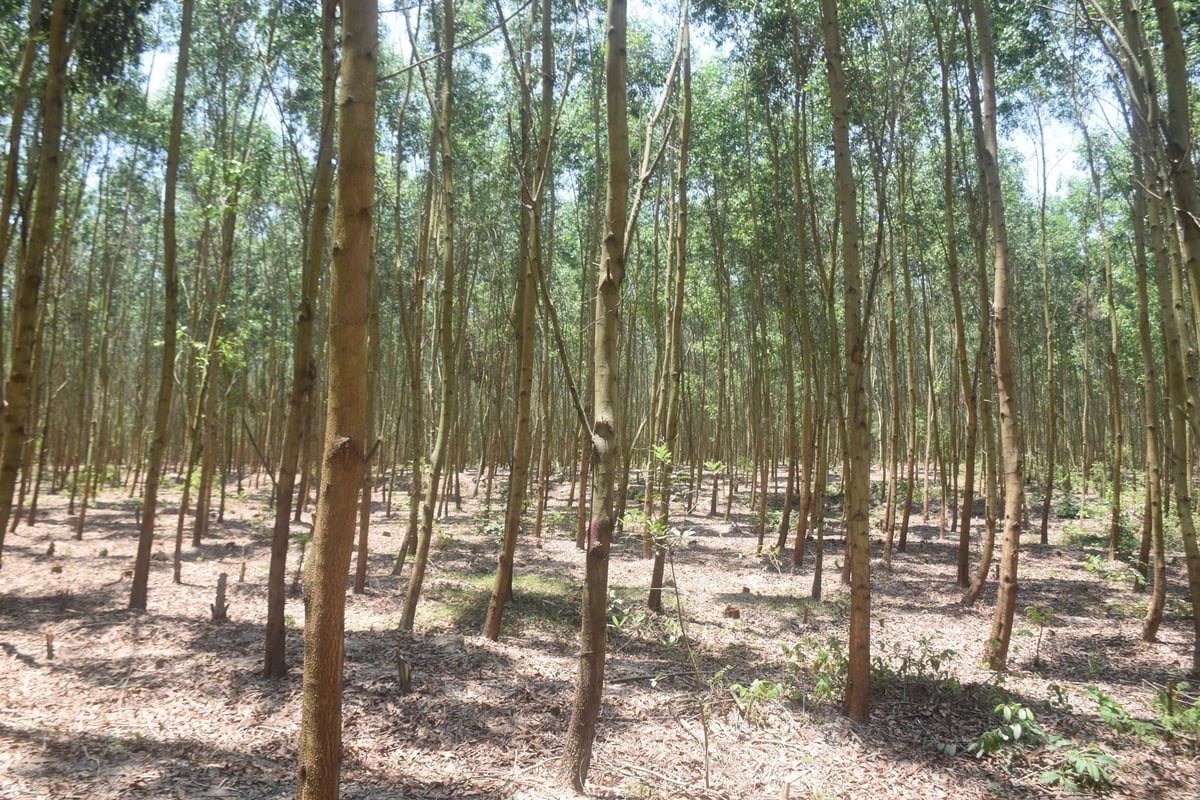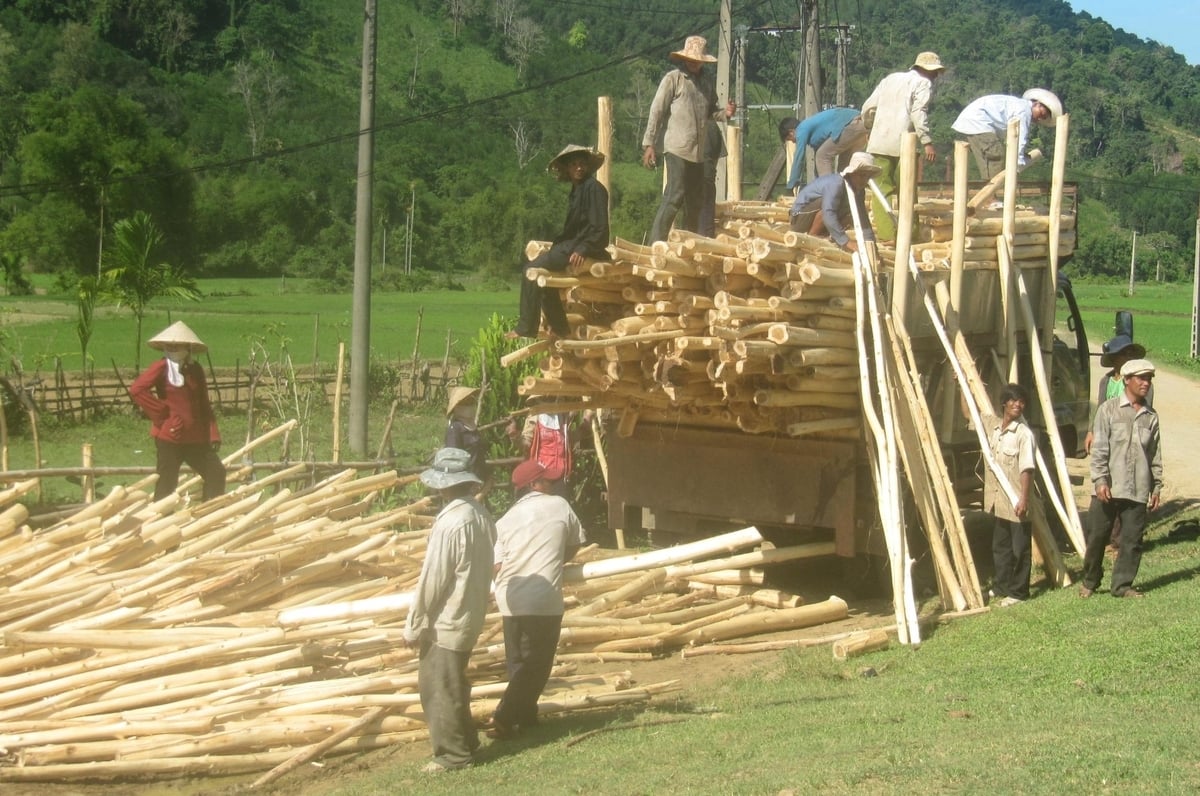January 2, 2026 | 18:21 GMT +7
January 2, 2026 | 18:21 GMT +7
Hotline: 0913.378.918
January 2, 2026 | 18:21 GMT +7
Hotline: 0913.378.918
The effective date of the European Union Deforestation Regulation (EUDR) is approaching, with just over five months remaining. Under the EUDR, European Union (EU) importers require wood processing businesses exporting to the EU market to demonstrate that their products are not linked to deforestation, forest degradation, or illegal logging and trade.

The EUDR requires wood processing businesses to demonstrate that their products are not linked to deforestation, forest degradation, or illegal logging and trade. Photo: Dinh Thung.
This poses a significant challenge for more than 350 wood processing enterprises in Gia Lai, most of which are concentrated in Quy Nhon. Approximately 50% of these businesses export their products to the EU market. Amid soaring prices and high risks associated with imported raw wood, processors have shifted toward sourcing timber from domestically planted forests as a safer alternative. However, this shift has raised new concerns.
More than 80% of Vietnam's production forests are cultivated by smallholder households on fragmented areas. On average, each household owns just over 2 hectares, and a large portion of this forest land lacks formal legal status.
Mr. Le Duc Sau, Head of the Gia Lai Forest Protection Sub-Department, stated, "In the former Binh Dinh province alone, there are 130,000 hectares of production forests, yet only about 45% of this area has been formally allocated with land-use rights by the authorities. The remaining planted forest areas were largely established on barren hills and wastelands that local people reclaimed on their own to generate additional income. These lands have not yet received the authorities' legal land-use allocation for afforestation."
According to Mr. Le Van Luong, General Director of Dai Thanh Furniture JSC (Quy Nhon Tay ward, Gia Lai), the EUDR mainly requires the traceability of raw wood. Forest land must have verifiable legality. The biggest concern for wood processing businesses is that much of the planted forest area in the region lacks legality, making it impossible to trace the origin of raw wood.
"On the business side, most of us have already upgraded to modern production lines to meet the requirements of demanding markets. We have implemented systems on quality and environmental management, certified wood, and corporate social responsibility, such as ISO 9001, FSC/VFCS-PEFC (CoC/FM), BSCI, SMETA, and CTPAT. The only remaining concern lies in the source of raw wood. Imported raw materials come with high transportation costs and risks, while domestically planted forest timber raises concerns over its ability to meet EUDR requirements," Mr. Luong expressed his concerns.

When purchasing raw wood, enterprises must require forest owners to verify that the forest is located on legally recognized, dispute-free land. Photo: Dinh Thung.
In response to the concerns raised by Mr. Le Van Luong, General Director of Dai Thanh Furniture JSC, Mr. Le Duc Sau, Head of the Gia Lai Forest Protection Sub-Department, shared that the Ministry of Agriculture and Environment has already introduced an implementation plan to address the traceability of legal raw wood in compliance with EUDR requirements.
According to Mr. Sau, the EU has set a timeline of December 31, 2020. From that point onward, forest-planting households are not allowed to cultivate on land converted from forests. Timber and wood products must also not contribute to forest degradation.
"The former Ministry of Agriculture and Rural Development (now the Ministry of Agriculture and Environment) issued Circular No. 26/2022/TT-BNNPTNT on December 30, 2022, which sets out regulations on the management and traceability of forest products. Under this circular, the forest protection sector has the function of verifying the legality of forest product documentation and managing and tracing the origin of forest products from natural forests. In the case of planted forests established through private investment, planting households have the right to determine harvest times and freely circulate and transport their wood. However, they are responsible for proving the legal origin of the raw wood and demonstrating that the forest was planted on land that did not result in deforestation or forest degradation," said Mr. Le Duc Sau.
Mr. Sau further emphasized that when purchasing raw wood, enterprises must require forest owners to verify that the forest is located on legally recognized, dispute-free land. The land used for forest plantations should be previously barren hills or wastelands reclaimed by the forest owners themselves and must not result from the clearing of natural forests.
"For raw wood harvested from planted forests under 4 hectares, traceability must be provided using coordinates. For areas over 4 hectares, raw wood must be traceable by region, with clearly defined boundaries on all four sides," shared Mr. Le Duc Sau, Head of the Gia Lai Forest Protection Sub-Department.
Translated by Thu Huyen
/2025/12/31/0650-2-160930_936.jpg)
(VAN) Alternate wetting and drying (AWD) irrigation helps reduce methane emissions, laying a solid foundation for sustainable rice production and serving as a basis for the formation of carbon credits.

(VAN) From extensive shrimp ponds, baskets of don gathered on the mudflats, to boats carrying visitors to watch birds, all livelihoods here depend on clean water, green forests, and the calls of migratory birds.
/2025/12/26/0703-3-204813_117.jpg)
(VAN) Transparency in information and listening to local people have helped address ground clearance bottlenecks and build social consensus, thereby accelerating the progress of the JICA3 irrigation project.
/2025/12/27/0609-3-233846_327.jpg)
(VAN) The JICA3 project is expected to become a 'water shield,' helping control saltwater intrusion, proactively secure water resources, protect livelihoods, and promote sustainable development in coastal areas.
/2025/12/26/5654-3-164509_655.jpg)
(VAN) As Viet Nam makes strong commitments toward achieving net-zero emissions, controlling and reducing methane emissions in livestock production is increasingly becoming a mandatory requirement.

(VAN) 'People, Primates, Plants: Co-managing Biodiversity and Improving Livelihoods in Vietnam' (the PPP Project) is an international initiative implemented in Vietnam by BGCI, CEGORN, and ICRAF/World Agroforestry.

(VAN) Dak Nong established a risk-level zoning map for coffee, built a digital data platform for the sector, and promoted certified production in line with EUDR.